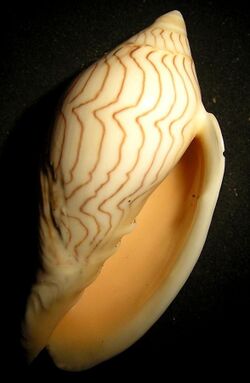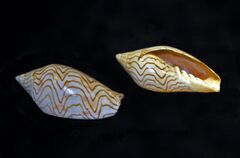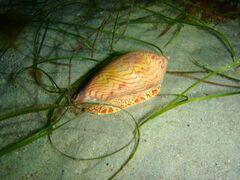Biology:Amoria undulata
| Amoria undulata | |
|---|---|

| |
| Apertural view of a shell of Amoria undulata angasii | |
| Scientific classification | |
| Domain: | Eukaryota |
| Kingdom: | Animalia |
| Phylum: | Mollusca |
| Class: | Gastropoda |
| Subclass: | Caenogastropoda |
| Order: | Neogastropoda |
| Family: | Volutidae |
| Genus: | Amoria |
| Species: | A. undulata
|
| Binomial name | |
| Amoria undulata (Lamarck, 1804)
| |
Amoria undulata, common name wavy volute, is a species of sea snail, a marine gastropod mollusk in the family Volutidae, the volutes.[1]
Synonyms
- Amoria (Amoria) undulata (Lamarck, 1804)
- Amoria kingi Cox, 1871
- Scaphella moslemica Hedley, 1912
- Voluta angasii Sowerby II, 1864
- Voluta australiae (Cox, 1872)
- Voluta sclateri Cox, 1869
- Voluta undulata Lamarck, 1804 (basionym)
Distribution
This marine species occurs off East Australia and Tasmania.[2]
Description

The length of the shell varies between 60 mm and 120 mm.[2] These shells are elongated, fusiform, smooth and solid and roundly shouldered, with long pointed conical spire. Suture shows a callous edge. The aperture is elongate, salmon to orange in colour, with smooth outer lip, thickened in adults. The base colour of the external surface of the shell is fawn or white-cream, with thin axial wavy brown lines. Foot shows similar coloured zigzag lines and stripes.[3][4][5]
Habitat
These sea snails live intertidally on sand and mud, at depths of 9 to 503 m. They live in deeper waters in their northern range. They emerge only at night to feed.[4][5][6]
Biology
These gastropods are carnivore, mainly feeding on other sea snails. In the spring Amoria undulata migrates from deep water to shallow water sandbanks to breed. It lays egg masses similar to a hollow cylinder, with a diameter of 16–20 millimetres (0.63–0.79 in). The embryos hatch as well developed juveniles and crawl away.[4][5]
Bibliography
- A. G. Hinton – Guide to Australian Shells
- Bail P. & Limpus A. (2001) The genus Amoria. In: G.T. Poppe & K. Groh (eds) A conchological iconography. Hackenheim: Conchbooks. 50 pp., 93 pls
- Harald Douté, M. A. Fontana Angioy – Volutes, The Doute collection
- Wilson, B. (1993). Australian Marine Shells Part 2
References
- ↑ Amoria undulata (Lamarck, 1804). Retrieved through: World Register of Marine Species on 10 January 2012.
- ↑ 2.0 2.1 "Amoria undulata" (in en). Gastropods.com. http://www.gastropods.com/2/Shell_2.shtml.
- ↑ Guide to the systematic distribution of Mollusca in the British museum. Part I.
- ↑ 4.0 4.1 4.2 Sea Shells of NSW
- ↑ 5.0 5.1 5.2 Museum Victoria Collections
- ↑ Molluscs of Tasmania
External links
Wikidata ☰ Q4747697 entry
 |


